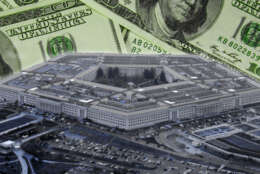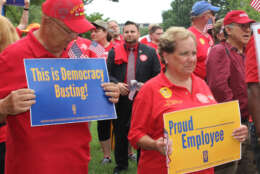Tony Reardon
-
Proposed regulations from the Office of Personnel Management prioritize an employee's performance over length of service when choosing who to retain during a reduction in force (RIF). The regulations are another piece of President Trump's 2018 executive order on employee firings.
December 16, 2020 -
The latest decision from a U.S. Court of Federal Claims judge means attorneys can begin what will likely be a lengthy pursuit of damages for excepted federal employees who worked without pay during the last government shutdown.
December 02, 2020 -
President-elect Biden has promised unions he'll repeal the 2018 executive orders designed to limit collective bargaining and official time. But simply repealing them won't immediately resolve issues.
November 20, 2020 -
Agencies reported a 28% drop in official time usage across government in 2019, according to a new report from the Office of Personnel Management.
November 17, 2020 -
The National Treasury Employees Union is suing the Trump administration over the president's recent Schedule F executive order. Three House Democrats introduced new legislation intended to nullify the EO and protect career federal employees impacted by it.
October 27, 2020 -
A new executive order from President Donald Trump will reclassify certain current and future positions in the career civil service as a new political class known as "Schedule F."
October 22, 2020 -
The Federal Salary Council is not recommending any new areas for 2022. But the council did engage in debate over the future of the federal locality program.
October 21, 2020 -
Participants in the Federal Employees Health Benefits Program (FEHBP) can expect to pay, on average, 4.9% more for their health insurance in 2021. Participants may pay more or less depending on the options they choose.
October 14, 2020 -
New proposed regulations from OPM reinterpret the agency's own 40-year-old reading of the Back Pay Act, and would limit the kinds of cases where federal employees could receive back pay, as well as exclude unions from receiving attorney fees.
October 07, 2020 -
In a collective bargaining dispute between the National Treasury Employees Union and the U.S. Patent and Trademark Office, an arbitrator said the agency committed unfair labor practices by implementing pieces of the president's 2018 workforce executive orders. Those practices, the arbitrator said, also run contrary to a longstanding federal labor-relations law.
September 23, 2020 -
Both federal civilian employees and active-duty military members will see temporary changes to their take-home pay as a result of the president's tax deferral, a senior administration official told Federal News Network. Though civilian employees and the military will see savings later this month, they're expected to pay back deferred taxes starting next January.
September 04, 2020 -
In an email sent to some civilian workers Tuesday, a large defense agency said no federal employee, department or payroll provider will be able to opt out of the president's upcoming payroll tax deferral planned later this month. All federal payroll providers are expected to "act in unison."
September 02, 2020 -
All federal providers are working to implement the payroll tax deferral policy President Donald Trump announced earlier this month in an executive order, the administration said Monday. The policy should be in place for federal employees by the second pay period in September.
August 31, 2020 -
The Energy Department said it was unlikely local conditions in the National Capital Region would support fully 'back to normal' return for its employees. The department instead said it will enter into new telework agreements with employees who need more flexibilities.
July 23, 2020 -
Under a Biden administration, President Donald Trump's 2018 workforce executive orders would go, the National Treasury Employees Union said Monday.
July 20, 2020














